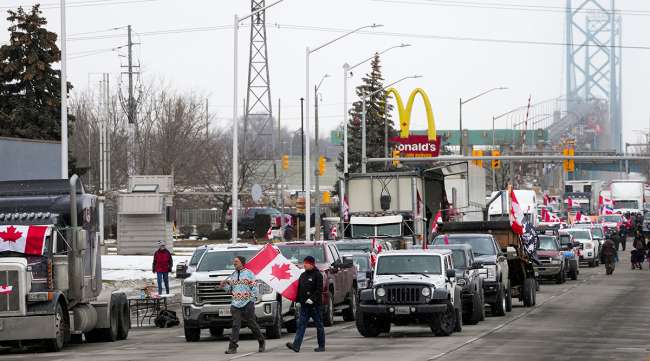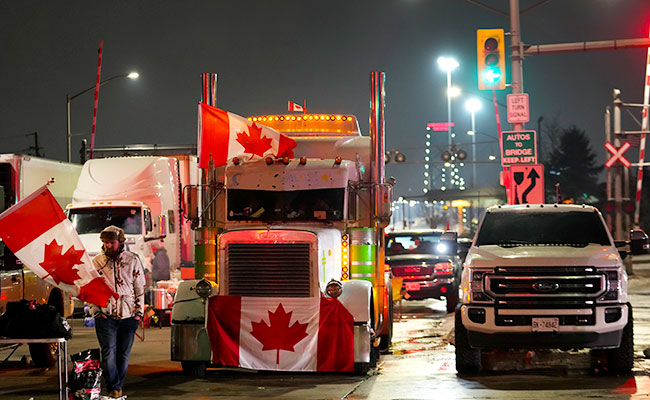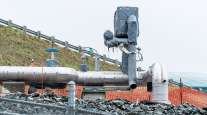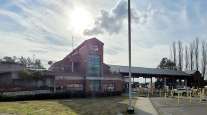Associated Press
US Urges Canada to Use Federal Powers to End Bridge Blockade

[Stay on top of transportation news: Get TTNews in your inbox.]
TORONTO — The Biden administration urged Prime Minister Justin Trudeau’s government Feb. 10 to use its federal powers to end the truck blockade by Canadians protesting the country’s COVID-19 restrictions, as the bumper-to-bumper demonstration forced auto plants on both sides of the border to shut down or scale back production.
For the fourth straight day, scores of truckers taking part in what they dubbed the Freedom Convoy blocked the Ambassador Bridge connecting Windsor, Ontario, to Detroit, disrupting the flow of auto parts and other products between the two countries.
American Trucking Associations spoke out against the notion of such efforts.
Want more news? Listen to today's daily briefing above or go here for more info
“ATA strongly opposes any protest activities that disrupt public safety and compromise the economic and national security of the United States,” ATA President Chris Spear said in a statement. “We held serious concerns about the unintended impact a vaccine mandate would have on our nation’s supply chain and ongoing COVID response efforts, which is why ATA challenged the OSHA rule all the way to the Supreme Court — where we prevailed.”
The White House said Homeland Security Secretary Alejandro Mayorkas and Transportation Secretary Pete Buttigieg spoke with their Canadian counterparts and urged them to help resolve the standoff.
Conservative Ontario Premier Doug Ford, meanwhile, moved to cut off funding for the protests by successfully asking a court to freeze millions of dollars in donations to the convoy through crowd-funding site GiveSendGo. Ford has called the protests an occupation.
Canadian officials previously got GoFundMe to cut off funding after protest organizers used the site to raise about $C10 million ($7.8 million.) GoFundMe determined that the fundraising effort violated the site’s terms of service due to unlawful activity.
Spear added, “We’ll continue to advocate on behalf of our members for policies that enable the industry to keep the supply chain moving, and we’ll do so in ways that do not hinder the safe and timely flow of commerce that everybody depends on.”
With political and economic pressure mounting, Windsor Mayor Drew Dilkens announced the city will seek a court injunction to end the occupation.
“The economic harm is not sustainable and it must come to an end,” he said.
In the U.S., authorities braced for the possibility of similar truck-borne protests inspired by the Canadians, and authorities in Paris and Belgium banned road blockades to head off disruptions there, too.

Truckers and supporters block the access leading from the Ambassador Bridge, linking Detroit and Windsor, as truckers and their supporters continue to protest against the COVID-19 vaccine mandates and restrictions in Windsor, Ontario, on Feb. 9. (Nathan Denette/The Canadian Press)
The U.S. Department of Homeland Security said in a bulletin to local and state law enforcement agencies that it has received reports that truckers are planning to “potentially block roads in major metropolitan cities” in a protest against vaccine mandates and other issues.
The agency said the convoy could begin in Southern California as early as this weekend, possibly disrupting traffic around the Super Bowl, and reach Washington in March in time for the State of the Union address, according to a copy of the Feb. 8 bulletin obtained by The Associated Press.
The White House said the department is “surging additional staff” to the Super Bowl just in case.
The Ambassador Bridge is the busiest U.S.-Canadian border crossing, carrying 25% of all trade between the two countries, and the effects of the blockade there were felt rapidly.
Ford said its Windsor engine plant reopened Feb. 10 after being shut down on Feb. 9 because of a lack of parts. But the factory and the company’s assembly plant in Oakville, Ontario, near Toronto, were operating at reduced capacity, the automaker said.
On the U.S. side, General Motors canceled the second shift on Feb. 9 and the first and second on Feb. 10 at its SUV factory outside Lansing, Mich.
Toyota said three of its plants in Ontario closed for the rest of the week because of parts shortages, and production also had to be curtailed in Georgetown, Ky.
Workers on the morning shift at a Windsor minivan plant operated by Stellantis, formerly Fiat Chrysler, were sent home early.
Michigan Gov. Gretchen Whitmer urged Canadian authorities to quickly resolve the standoff, saying: “It’s hitting paychecks and production lines. That is unacceptable.”

Host Seth Clevenger, fresh from CES, discusses autonomous and electric trucks with Joe Adams of Kenworth and Cheng Lu of TuSimple. Hear a snippet above, and get the full program by going to RoadSigns.TTNews.com.
The Teamsters denounced the blockade, saying in a statement from General President Jim Hoffa that it threatened “the livelihood of working Americans and Canadians in the automotive, agricultural and manufacturing sectors.”
Hundreds of demonstrators in trucks have also paralyzed the streets of downtown Ottawa for almost two weeks now, and have now closed three border crossings: at Windsor; at Coutts, Alberta, opposite Montana; and at Emerson, Manitoba, across from North Dakota.
The protesters are decrying vaccine mandates for truckers and other COVID-19 restrictions and are railing against Trudeau, even though many of Canada’s precautions, such as mask rules and vaccine passports for getting into restaurants, theaters and other places, were enacted by provincial authorities, not the federal government, and are already rapidly being lifted as the omicron surge levels off.
Trudeau continued to stand firm against lifting vaccine mandates, including a requirement that all truck drivers entering the country be fully vaccinated. But because an estimated 90% of the nation’s truckers are already inoculated, some conservatives have called on the prime minister to drop the mandate.
To get around the blockade and into Canada, truckers in the Detroit area have had to drive 70 miles north to Port Huron, Mich., and cross the Blue Water Bridge, where there was a two-hour delay leaving the U.S.
Krisher and Associated Press Writer Mike Householder contributed from Detroit. AP writers Aamer Madhani, Ben Fox and Amanda Seitz contributed from Washington.




